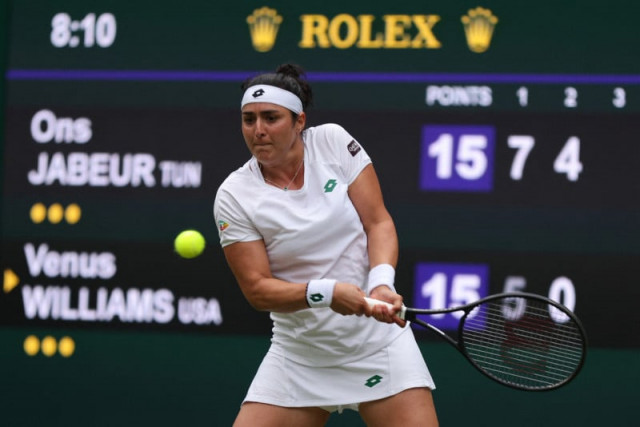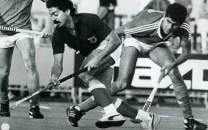Jabeur hopes exploits galvanise Arab women to play on tennis tour
26-year-old brushed aside five-time Wimbledon winner Venus Williams to reach the third round for the first time

Ons Jabeur says "being the only Arab (woman)" on the tennis tour "is not easy" but she hopes one day there will be a whole group of them like the Americans and French.
The 26-year-old Tunisian is setting a fine example to ensure this is fulfilled by becoming the first Arab woman to win a WTA tournament title in Birmingham, England, earlier this month.
On Wednesday she brushed aside five-time Wimbledon singles title winner Venus Williams in straight sets to reach the third round for the first time.
"Being the only Arab is not easy to be on tour right now," she said.
"Hopefully, you never know. Maybe now someone is watching and wants to be here in my place.
"I just want to say if I did it, it's not impossible.
"Like I said before, I always try to inspire other generations."
Williams herself said before the match that Jabeur would achieve her goal.
"You're gonna see a whole other generation of women from North Africa coming into tennis," she said.
"It's going to be all owed to her."
Jabeur -- who along with second seed Aryna Sabalenka has won more matches on tour this year than their rivals -- says former top Moroccan male player Hicham Arazi has been helpful.
Jabeur only realised after the French Open this year he had been writing to her on Instagram since last year's Australian Open.
"I'm, like, I didn't see your messages," she said.
"Such an honour, you know. He gave me few tips about the game.
"And honestly he did say things that I related during my career right now, and I told him, like, We should meet and play.
"He said, he would have to work on his fitness and the condition to be able to play me," she added.
Jabeur says she did not watch a lot of tennis when she was growing up and it was her now husband Karim Kamoun who was more "obssessed by Roland Garros."
She had heard of Tunisian female player Selima Sfar -- who reached a career high of 75 in the world in 2001 -- but had not watched her play.
However, to be compared as she was to four-time Grand Slam quarter-finalist Arazi was a great honour.
"I think I grew up with a goal in my head to really be one of the good players," she said.
"It was like very, very personal for me.
"It's funny because everybody compares me to Hicham Arazi.
"Since he really was talented player and everybody is, like, Oh, man, you remind me of Hicham Arazi, unbelievable.
"I mean, it's an honour for me."
Jabeur -- who plays Spain's 2017 Wimbledon champion Garbine Muguruza in the third round -- said as he inspired her so she hopes she can do the same for Arab women.
"Honestly, he really inspired me, and I am trying to do the same here," she said.
"I like to see how French people are together, Americans, Australian, and I feel like I want to see this, you know, with my country.
"It doesn't matter, Tunisia or Egypt or Morocco, I really want to see more and more players."
There is one barrier she wants to break down that Arazi did not manage during his successful career.
"To be able to pass the quarter-final of a Grand Slam, like it's something that I should do," said Jabuer, whose best showing is a quarter-final at the 2020 Australian Open.
"Because it was kind of I think with him, with Karim, it was kind of difficult to get past the quarterfinals.
"So he has encouraged me to do that."



















COMMENTS
Comments are moderated and generally will be posted if they are on-topic and not abusive.
For more information, please see our Comments FAQ